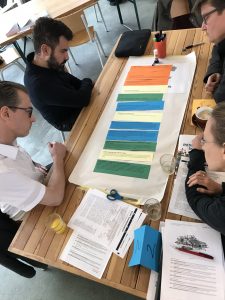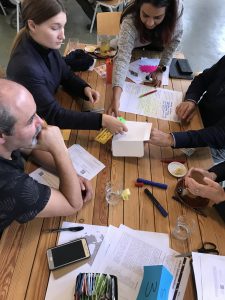Join JPI UE
Faq
FAQ
Please click here for the frequently asked questions we collected.
If you have an additional questions you are welcome to mail us at info@jpi-urbaneurope.eu
Why re-think and develop Urban Living Labs?
Urban Living Labs have over the recent decade become a common type of co-creative experimentation, offering us the opportunity to research and innovate on a wide variety of challenges in everyday settings and test hypothesis and elements to pathways for making transitions towards urban sustainable living. Europe seems particularly a hotspot for this approach. A typical ULL will run for along as a project (usually three years) and after this period data is collected, results are drawn together, a summary is written and, in some situations, changes in the wider urban context happen. However, mounting concern by practice, innovators, and research is that this last step is too rare and after the project funding stops there is little systematic integration of any of the practical outputs. Hence, the intended and potential contribution by ULL to urban transformation seems unfulfilled. Therefore, the symposium targeted issues of policy making in diverse (physical and civil) environments, urban governance, sustainable and integrated long-term learning and in short: whether to move from Urban Living Labs 1.0 towards a “2.0”.


Urban Living Labs for sustainable urban transformation?
A key message and outcome from the 24 hours of workshopping in Maastricht, is to not transition into a 2.0 version of a 1.0 version that is far from perfect. In other words, we need to get to the core of the disadvantages and faulting in the ways that ULL are run and used today, to get to a new and improved version. Such faults include excluding vocabularies, over-emphasis on technological solutions and “solutionism” in general. “Solutionism” can be opposed with challenge-driven approach, anchored in and initiated from a local level- by communities and in an integrated manner together with local policy makers. These problematics relates to the ULL tendencies to focus on outcome and result deliveries in terms of products, devices and similar “productions”. Instead, a shift towards “learning” and “process” developments should be central to the purposes of ULLs according to the symposium participants. The importance of making ULL an integral part of governance is a way to ensure both impact and the sustainability of the efforts made.
JPI Urban Europe will continue exploring and developing Urban Living Labs so that future projects, calls and project portfolios can improve its potential to contribute to urban transformation and be instruments for urban governance to realize more sustainable urban environments.
Read more
Webinar Urban Lunch Talk #7: From Test to Success
JPI Urban Europe at the Open Living Lab Days 2019 in Thessaloniki, Greece